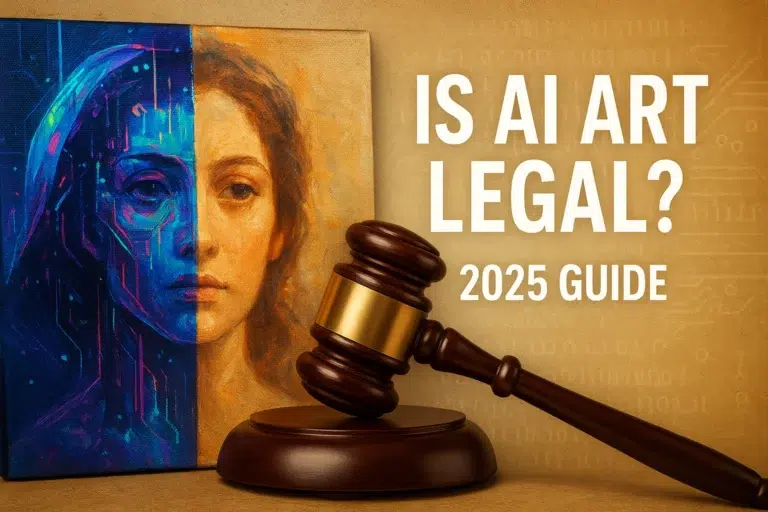AI art is exploding in popularity, but the legal side is still messy. In short: AI-generated art usually has no clear copyright protection, ownership often depends on the human input involved, and commercial use is allowed — but risky if you don’t check the source. Let’s break this down in plain English.
In most countries, you can’t copyright something made entirely by AI with no human input. Some regions (like the U.S.) have ruled against AI-only works, while others (like the UK) allow limited protection for “computer-generated works.”
If you’re using AI art commercially, your safest bet is to add meaningful human creativity — edits, modifications, or integration into a larger project — so it qualifies for copyright.
In this guide, I’ll break down:
- Whether AI art can be copyrighted in 2025 (country by country),
- Who really owns AI-generated art,
- The legal risks of selling or publishing AI art,
- And best practices for using AI tools safely in your projects.
👉 If you’re also exploring ways to monetize digital art, check out our related guide on How to Sell Art as NFT.
What Does “AI Art Legal” Really Mean in 2025?
When people ask “Is AI art legal?”, they usually mean one of three things:
- Can I own the copyright to AI art I generate?
- Can I use AI art for commercial projects without being sued?
- Can I sell or mint AI art as NFTs without running into trouble?
The answers depend on your country’s laws and how much human creativity is in the process.
In 2025, most courts (US, UK, EU) say AI alone can’t hold copyright. But if you contribute substantial creative input (like prompts, edits, or combining AI with your own design), you may claim copyright. Commercial use is legal, but you need to be careful about training-data disputes.
If you’re experimenting with AI-generated art yourself, you might find our list of the Best AI Art Generators helpful for comparing the top tools.
Who Owns AI-Generated Art?
Ownership is the biggest gray area.
If art is fully machine-generated, no one technically owns the copyright. But if you, as the human, shape the prompt or edit the result, you might qualify as the author.
Real-World Examples:
- US Case: The U.S. Copyright Office (2023–2024) denied copyright protection for works created “solely by AI.” But it granted partial rights when a human artist combined AI outputs with personal edits.
- Reddit Artist Threads: Many NFT artists on r/CryptoArt share that they watermark or remix AI outputs to strengthen their ownership claims.
Quick Guide (2025):
- Pure AI Output (no edits): Usually no copyright.
- AI + Human Prompt Engineering: Weak claim, depends on originality.
- AI + Human Edits/Composites: Stronger chance of ownership.
If you’re creating for commercial use, check platform ToS (MidJourney, OpenAI, Adobe Firefly).
Can You Use AI Art Commercially?
Yes, you can sell AI art, use it in ads, print it on t-shirts, or mint it as NFTs — but only if your platform allows it and you’re sure the AI didn’t directly copy another artist’s work.
Things to Watch Out For:
- Licensing: Some platforms (like MidJourney, DALL·E) allow commercial use only on paid plans.
- Training Data Lawsuits: Getty Images sued Stability AI for allegedly scraping copyrighted photos. If you sell AI art that looks “too similar,” you could be at risk.
- NFT Marketplaces: OpenSea allows AI art NFTs, but collectors are becoming picky about originality.
In my opinion, if you’re using AI art for brand work, always add human edits. That way, you protect yourself and also stand out creatively.
Is Selling AI Art as NFTs Legal?
Yes, selling AI art NFTs is legal, but the risk is in originality and copyright claims.
How to Do It Safely:
- Use platforms that clearly state you can commercialize outputs (e.g., MidJourney paid plan, RunwayML).
- Add unique creative layers (collage, typography, animation).
- Document your creation process (prompt + edits) to prove authorship if needed.
Example: On Foundation and SuperRare, AI-art collectors now demand “proof of process” before buying. One artist on Twitter shared that they lost a $5,000 sale because they couldn’t prove the work wasn’t “just a stock AI output.”
How Do Different Countries Treat AI Art Legally?
Laws vary — the US and UK generally reject pure AI copyright, while Japan and China are more open to AI-created works being owned.
Breakdown:
- US: Human authorship required (Copyright Office).
- UK: Copyright goes to the “person making arrangements” for AI work (still debated).
- EU: Leaning toward human authorship, AI-only works not protected.
- China: Courts have upheld AI works as copyrightable in some cases.
- Japan: Allows AI works in commercial settings, but authorship rules unclear.
Pro tip: If you’re minting NFTs or licensing AI art, always check local laws. A piece that’s public domain in the US may still be protected in China.
Anime-style creations are especially popular with AI. Before you publish or sell them, explore our AI Anime Art Generator guide to see how fan art intersects with copyright law.
Can AI Art Infringe Copyright of Others?
Direct answer: Yes, AI art can unintentionally copy training data, especially if prompts include “in the style of [Artist].”
Red Flags to Avoid:
- Using prompts like “draw in the style of Van Gogh / Greg Rutkowski.”
- Uploading copyrighted images to train personal AI models.
- Selling AI outputs that are nearly identical to existing works.
Example: In 2024, several artists filed lawsuits against Stability AI claiming their styles were cloned without consent. Expect more cases like this in 2025.
How to Use AI Art Legally and Safely (Checklist)
Here’s a step-by-step legal safety net if you’re working with AI art in 2025:
- ✅ Use paid AI tools with clear licenses.
- ✅ Keep records of prompts, edits, and process.
- ✅ Avoid direct “in the style of [living artist]” prompts.
- ✅ Add personal creative contributions (editing, mixing).
- ✅ For NFTs, include proof-of-process for buyers.
- ✅ When in doubt, consult copyright laws in your jurisdiction.
FAQs on AI Art Legality (2025)
Q3. Can I sell images created by ChatGPT?
Yes, you can — OpenAI’s official licensing terms allow commercial use of images made with DALL·E (the tool ChatGPT integrates with). I’ve personally seen creators on Etsy and Redbubble selling DALL·E-generated prints without issues, though you can’t claim exclusive copyright.
Q3. Has anyone been sued for using AI?
Most lawsuits so far (like Getty Images vs. Stability AI and NYT vs. OpenAI) target the companies, not everyday users. I haven’t found a case of a small creator being sued just for posting or selling AI art, but the legal climate is still shifting.
Q3. Can you get in trouble for using AI images?
Not usually. The main risks are if you:
Copy a living artist’s style too closely
Violate trademarks (like Disney characters)
Break the platform’s rules (MidJourney bans certain uses)
I’d say if you’re making original, general-purpose AI art, you’re on safe ground.
Q4. Can I use AI-generated art for free?
You can usually use free outputs personally, but not all platforms give free commercial rights. For example, Adobe Firefly’s free plan has stricter licensing than its paid plan. Always check the usage rights tab — I learned this the hard way when a “free” design got flagged on print-on-demand.
Does Canva own my designs?
No. According to Canva’s licensing page, you keep ownership of your designs. I’ve also seen users on Reddit clarify that while Canva doesn’t claim ownership, you can’t stop others from making similar AI-generated results since the outputs aren’t exclusive.
Which AI image generator has no restrictions?
Open-source models like Stable Diffusion are the closest to “no restrictions,” since you can run them locally without platform rules. But that doesn’t mean the law gives you a free pass — you’re still responsible if you make something that infringes copyright. I’ve seen people on Hugging Face forums stress this exact point.
Is AI art a threat to artists?
Some artists feel undercut — I’ve read stories on ArtStation where commissions dried up after AI generators became mainstream. Others, though, use AI as a sketching partner to speed up workflows. The real “threat” isn’t legal yet, it’s more about market dynamics and consent in training data.
Final Thoughts: Should You Rely on AI Art in 2025?
AI art is here to stay, but the law is still catching up. In my opinion, the safest strategy is to treat AI as a creative assistant, not a replacement. Use it for inspiration, drafts, and raw ideas — then refine manually. That way, you stay legal, original, and competitive.
If you’re deep into AI art + NFTs, I’d also recommend reading our guide on Best AI Art Generators in 2025 and our breakdown of NFT Copyright Issues (internal link).
💡 External sources you can safely cite in edits:
- U.S. Copyright Office AI Guidance
- UK Intellectual Property Office AI & Copyright
- Getty vs. Stability AI lawsuit (Reuters / CoinDesk coverage)
Adrian Smith is a Web3 strategist and lead writer at CryptoBrandHub.com, with 8+ years of experience in crypto marketing, NFT monetization, and DeFi tools. He helps creators and investors navigate the fast-changing world of blockchain with practical, research-backed insights.

